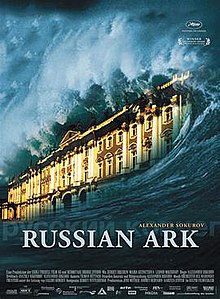| Russian Ark | |
|---|---|
 Theatrical release poster | |
| Directed by | Alexander Sokurov |
| Written by | Anatoli Nikiforov Alexander Sokurov |
| Produced by | Andrey Deryabin Jens Meurer Karsten Stöter |
| Starring |
|
| Narrated by | Alexander Sokurov |
| Cinematography | Tilman Büttner |
| Edited by | Stefan Ciupek Sergei Ivanov Betina Kuntzsch Patrick Wilfert |
| Music by | Sergei Yevtushenko |
Production company | Seville Pictures |
| Distributed by | Wellspring Media |
Release dates |
|
Running time | 96 minutes |
| Countries |
|
| Languages |
|
| Budget | ~$2.5 million[1] |
| Box office | $8.7 million[2] |
Russian Ark (Russian: Русский ковчег, romanized: Russkij kovcheg) is a 2002 experimental historical drama film directed by Alexander Sokurov. The plot follows an unnamed narrator, who wanders through the Winter Palace in Saint Petersburg, and implies that he died in some horrible accident and is a ghost drifting through. In each room, he encounters various real and fictional people from various periods in the city's 300-year history. He is accompanied by "the European", who represents the Marquis de Custine, a 19th-century French traveler.[3]
An international co-production between Russia and Germany, Russian Ark was shot entirely in the Winter Palace of the Russian State Hermitage Museum on 23 December 2001, using a one-take single 87-minute Steadicam sequence shot. It extensively uses the fourth wall device, but repeatedly broken and re-erected. At times, the narrator and the companion interact with the other performers, while at other times they pass unnoticed.
The film was entered into the 2002 Cannes Film Festival.[4] Russian Ark is widely regarded as one of the greatest Russian films of all time.[5]
- ^ "Что такое "Русский ковчег"". Коммерсантъ (in Russian). Kommersant. 25 December 2001. Retrieved 16 September 2019.
- ^ Cite error: The named reference
mojowas invoked but never defined (see the help page). - ^ Peter Rollberg (2009). Historical Dictionary of Russian and Soviet Cinema. US: Rowman / Littlefield. pp. 593–594. ISBN 978-0-8108-6072-8.
- ^ "Festival de Cannes: Russian Ark". festival-cannes.com. Retrieved 25 October 2009.
- ^ Vasileva, Mirella (17 February 2018). "The 10 Best Russian Movies of All Time". Taste of Cinema - Movie Reviews and Classic Movie Lists. Retrieved 8 August 2022.